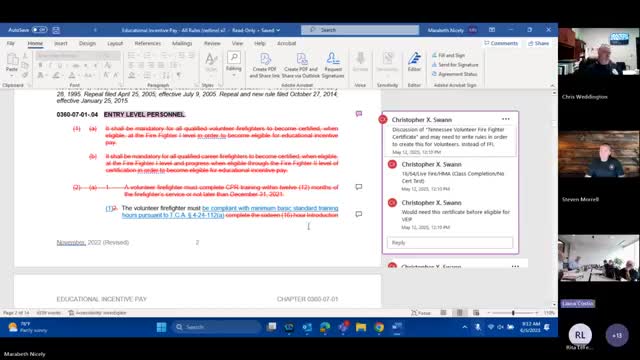Fire Training Standards Debate Escalates in Tennessee's Volunteer Firefighter Community
June 07, 2025 | Commerce & Insurance, Deparments in Office of the Governor, Organizations, Executive, Tennessee
This article was created by AI summarizing key points discussed. AI makes mistakes, so for full details and context, please refer to the video of the full meeting. Please report any errors so we can fix them. Report an error »

In a recent meeting of the FFC Rules Subcommittee held on June 5, 2025, significant discussions emerged regarding the training requirements for volunteer firefighters in Tennessee. The meeting highlighted the complexities surrounding the certification process and the need for clarity in training standards, particularly as they relate to firefighters coming from other states.
One of the primary concerns raised was the inconsistency in the number of training hours required for certification. Participants noted that while Tennessee's minimum basic training is often cited as 64 hours, this figure has become somewhat outdated and may not accurately reflect the training provided by other states. For instance, some states, such as Mississippi, require a minimum of 120 training hours, which raises questions about the adequacy of Tennessee's standards.
The subcommittee discussed the importance of allowing local authorities, referred to as Authorities Having Jurisdiction (AHJs), to assess the training of incoming firefighters. This flexibility would enable AHJs to determine whether the training received from other states meets Tennessee's standards, rather than requiring all out-of-state firefighters to undergo additional training unnecessarily. The conversation emphasized the need for a more inclusive approach that recognizes equivalent training, which could help retain qualified personnel and address staffing shortages.
Another key point of discussion was the potential removal of specific hour requirements from the training standards. Some members suggested that instead of tying certification to a specific number of hours, the focus should be on ensuring that firefighters complete a "minimum basic standard training." This change could simplify the certification process and reduce confusion regarding varying training programs across states.
The meeting concluded with a consensus on the need for clearer guidelines that would facilitate the verification of training certificates while maintaining high standards for firefighter readiness. As the subcommittee moves forward, the proposed adjustments to the training requirements could significantly impact how volunteer firefighters are certified in Tennessee, ultimately enhancing the effectiveness and safety of fire services across the state.
One of the primary concerns raised was the inconsistency in the number of training hours required for certification. Participants noted that while Tennessee's minimum basic training is often cited as 64 hours, this figure has become somewhat outdated and may not accurately reflect the training provided by other states. For instance, some states, such as Mississippi, require a minimum of 120 training hours, which raises questions about the adequacy of Tennessee's standards.
The subcommittee discussed the importance of allowing local authorities, referred to as Authorities Having Jurisdiction (AHJs), to assess the training of incoming firefighters. This flexibility would enable AHJs to determine whether the training received from other states meets Tennessee's standards, rather than requiring all out-of-state firefighters to undergo additional training unnecessarily. The conversation emphasized the need for a more inclusive approach that recognizes equivalent training, which could help retain qualified personnel and address staffing shortages.
Another key point of discussion was the potential removal of specific hour requirements from the training standards. Some members suggested that instead of tying certification to a specific number of hours, the focus should be on ensuring that firefighters complete a "minimum basic standard training." This change could simplify the certification process and reduce confusion regarding varying training programs across states.
The meeting concluded with a consensus on the need for clearer guidelines that would facilitate the verification of training certificates while maintaining high standards for firefighter readiness. As the subcommittee moves forward, the proposed adjustments to the training requirements could significantly impact how volunteer firefighters are certified in Tennessee, ultimately enhancing the effectiveness and safety of fire services across the state.
View full meeting
This article is based on a recent meeting—watch the full video and explore the complete transcript for deeper insights into the discussion.
View full meeting
